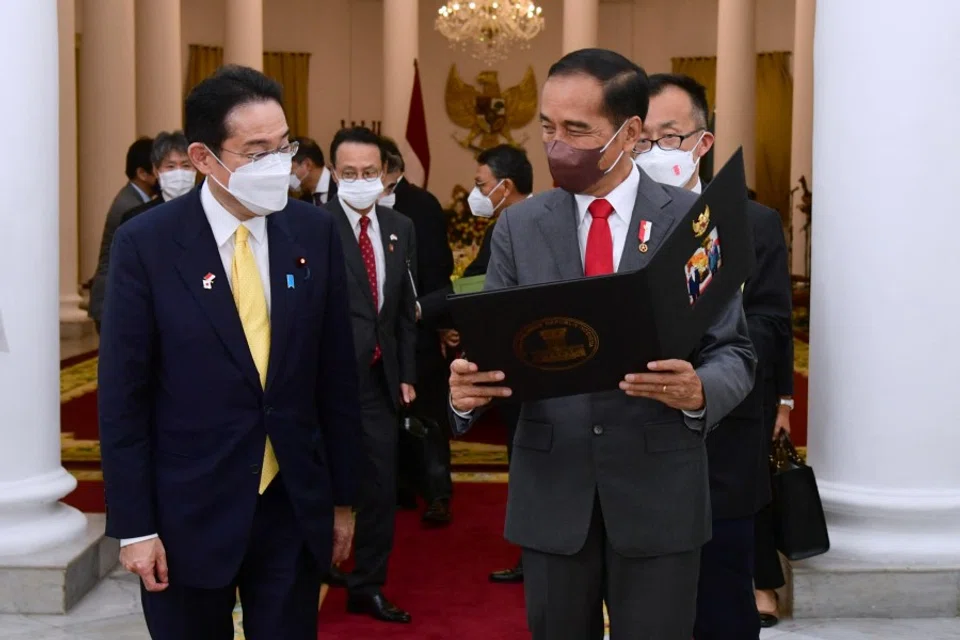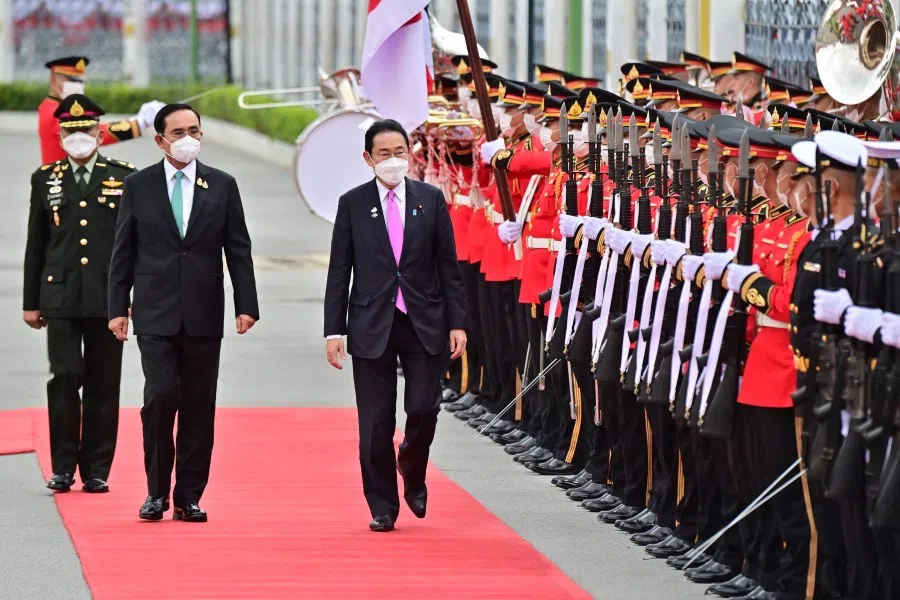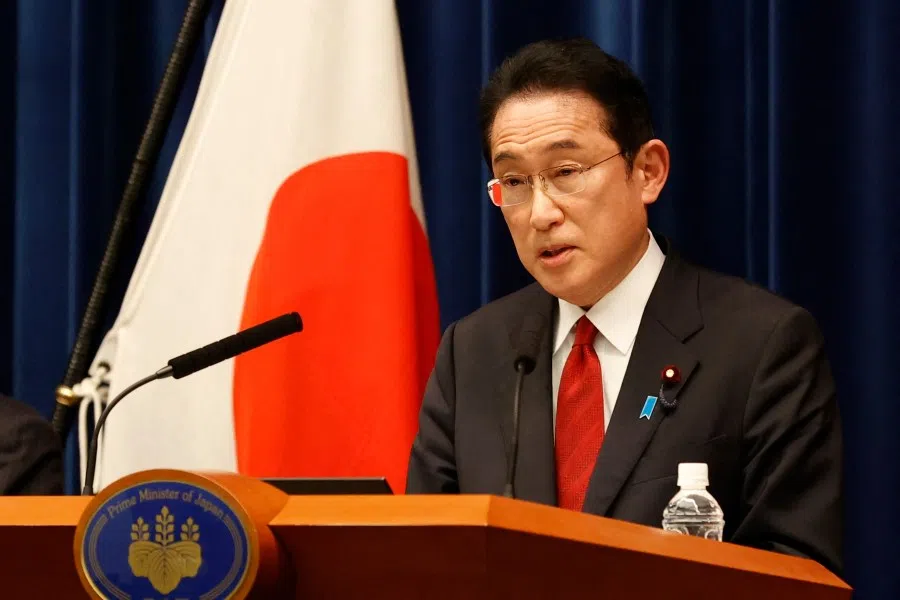Kishida's charm diplomacy in Southeast Asia: Moral suasion does the trick
Japan's Prime Minister Fumio Kishida's visits to Indonesia, Vietnam and Thailand have burnished Japan's regional credentials, particularly on contentious issues such as the war in Ukraine, the South China Sea disputes and the evolving order in the Indo-Pacific.

Japanese Prime Minister Fumio Kishida embarked on a three-nation tour of Southeast Asia starting in late April. His swing through Indonesia, Vietnam and Thailand follows after trips to India and Cambodia. Kishida's forays were aimed at burnishing Japan's regional leadership credentials, particularly on big-ticket issues such as the Russian invasion of Ukraine, the South China Sea dispute and Japan's vision of a "free" and "open" Indo-Pacific.
Kishida's tour of Southeast Asia follows the paths taken by his predecessors. On his first overseas trip in 2013, Shinzo Abe visited the same three Southeast Asian countries. This was perceived as Japan's "return" to Southeast Asia at that time.
Deepening economic ties
During his trip, Kishida worked hard at what Japan already excels in: deepening economic ties. In Indonesia, he stressed bilateral cooperation in many fields, including the trade, infrastructure and maritime sectors. He said that Japan would continue to cooperate with Indonesia on building Jakarta's Mass Rapid Transit system, developing smart cities and improving fishery facilities on Indonesia's remote islands.
In Vietnam, Prime Minister Pham Minh Chinh said Hanoi and Tokyo agreed to boost cooperation in post-pandemic trade, supply chains and Vietnam's energy transition. In Thailand, Kishida and his Thai counterpart General Prayut Chan-ocha signed an agreement on financial cooperation and support for Thailand's Covid-19 emergency response. PM Prayut said that the countries have started drafting an agreement for an economic partnership.

Role as a security partner
In the security dimension, Kishida said that Japan would begin research into possibly providing a patrol vessel to Indonesia to assist in ensuring maritime security and improving safety, including patrolling the Sulu-Celebes Sea, an area long afflicted by piracy.
It was on the broader and strategic issues - maritime security in the South China Seas, the war in Ukraine and the region's evolving security architecture - that Kishida gained some traction.
Japan inked a new defence agreement with Thailand that will see the transfer of defence kit and technology to Bangkok. Despite being a treaty ally, Thailand's relations with the US were complicated by the 2014 military coup. This pushed Bangkok closer to Beijing in the immediate post-coup period, even as the US and Thai militaries have continued their interactions. Against this backdrop, Tokyo is stepping up its role as a security partner in the region.
It was on the broader and strategic issues - maritime security in the South China Seas, the war in Ukraine and the region's evolving security architecture - that Kishida gained some traction. Indonesia and Japan affirmed that they would work together to ensure "free and open" seas based on international law. In essence, this was a reaction to China's assertiveness in the East and South China Seas, and Russia's continued aggression in Ukraine.
Repeating a line oft-used by Abe, Kishida said that he and Vietnamese PM Chinh agreed that "any change in the status quo by force (in Ukraine) cannot be recognised". Kishida and Chinh used similar language when discussing the South China Sea.
A softer approach
On the war in Ukraine, Kishida pushed to find common ground with his Southeast Asian counterparts. Japan has condemned Russia's invasion of Ukraine and effected economic sanctions, while Indonesia, Thailand and Vietnam have issued more muted responses. They have called for the respect of sovereignty and territorial integrity but have not condemned Russia directly nor implemented sanctions.
Even though the US and many European countries have taken a muscular approach towards Moscow and even called for a boycott of the G20 meetings if Putin attends, Japan has said that it is "in no position" to respond to participation by individual countries.
Indonesian President Joko Widodo (Jokowi) called for a stop to the hostilities and said that Japan and Indonesia agreed that "negotiations and a peaceful solution can be reached quickly". True to Indonesia's non-aligned tradition, Jokowi reiterated that Indonesia as the chair of the G20 meetings had decided to invite Ukrainian President Volodymr Zelensky and his Russian counterpart Vladimir Putin to the Bali summit in November. Kishida was conspicuously silent on the issue.
Even though the US and many European countries have taken a muscular approach towards Moscow and even called for a boycott of the G20 meetings if Putin attends, Japan has said that it is "in no position" to respond to participation by individual countries. Seeking to minimise differences, Kishida stressed that Tokyo will "extend its utmost support to Indonesia" as G20 chair. This is a quintessential Japanese approach: not pushing Indonesia into a corner yet retaining flexibility.
Kishida hailed Vietnam's pledge to offer US$500,000 to Ukraine through international organisations. The figure is modest, but helps to fix the perception that Hanoi is siding with Moscow in the conflict.

During Kishida's Hanoi visit, neither Kishida nor Chinh singled out Russia's aggression in Ukraine, but both stressed the need for the international community to respect the independence and sovereignty of states. This guarded sentiment is likely due to Vietnam's complex relations with Moscow, particularly as a buyer of Russian military kit.
But Kishida scored a victory: both leaders agreed on the importance of a ceasefire in Ukraine and the provision of humanitarian aid. Kishida hailed Vietnam's pledge to offer US$500,000 to Ukraine through international organisations. The figure is modest, but helps to fix the perception that Hanoi is siding with Moscow in the conflict.
Compared to Washington...Japan's softer and persuasive approach with regional Asian countries is making inroads.
Japan secured some rhetorical support from Indonesia, Thailand and Vietnam on the need for a "free and open" international order based on the rule of law - an important component of the Free and Open Indo-Pacific (FOIP) strategy that Japan advocates with its Quad partners the US, India and Australia. Japan's readout of Kishida's summit meeting with Jokowi said that the situations in Ukraine, the East and South China Seas and North Korea mean that it is "even more important" to "maintain and strengthen" such a rules-based international order.
Similar points were reiterated in Japan's readout of the summit meeting with PM Chinh; Kishida stressed that Russia's activities in Ukraine is a "clear violation of international law", and that "any unilateral change by force should not be tolerated in any region". The two leaders stressed that compliance with the 1982 United Nations Convention on the Law of the Sea (UNCLOS) is "indispensable" for "peace and stability" in the South China Sea.
Such statements of shared principles by Japan and its ASEAN partners do not mean that the latter support FOIP, which is mostly perceived as a platform by the US and its FOIP partners to cast the region in a geopolitical frame (in other words, managing the rise of China). ASEAN's Outlook on the Indo-Pacific (AOIP) casts the region in an apolitical geographical frame.
Nevertheless, Kishida's small discrete gains during his Southeast Asian sojourn have burnished Tokyo's leadership credentials. Compared to Washington, which has tended to directly articulate its interests when it comes to influencing China's behaviour, Japan's softer and persuasive approach with regional Asian countries is making inroads. According to the 2022 State of Southeast Asia survey, Japan remains the most trusted major power in Southeast Asia. Tokyo should stay the course.
This article was first published by ISEAS - Yusof Ishak Institute as a Fulcrum commentary.
Related: What explains Southeast Asia's trust in Japan? | US academic: Consequences if Southeast Asia fails to align with US on China policy | The real reason why Japan is following the US's lead | Japan passes China in the sprint to win Cambodian hearts and minds | It's hard to be neighbours: When will Japan advance its diplomacy with China and South Korea?






